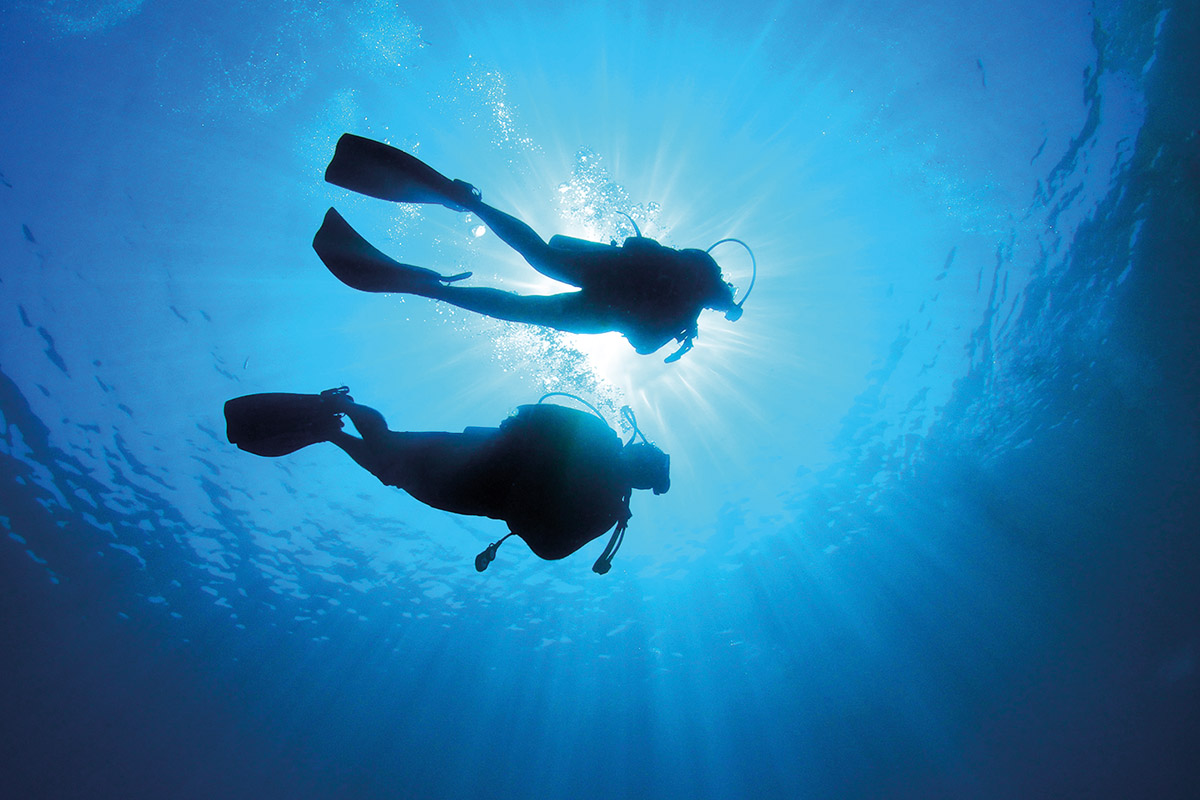
Mark ‘Crowley’ Russell explains the important difference between weight and mass and how it impacts on your diving
There are several scuba training programmes where students are required to support themselves at the surface of the water for a period of time without buoyancy aids, a portion of which must be completed with their hands out of the water. The exercise is not a measure of personal fitness, rather it is a measure of comfort in the water.
When I conducted such exercises during Divemaster courses, I found a certain irony in the way that muscular, athletic candidates would often struggle to remain at the surface, and would sink when they raised their hands. Larger people, sometimes more fond of food and less of exercise, however, would often find it very easy. I remember one chap who just lay back, folded his hands over his ample stomach and floated comfortably for the entire exercise.
As scuba divers, one of our most important considerations is, of course, weight. The weight of the lead we carry, the weight of our gear, and the weight of our bodies. Weight, however, is not the whole story.
Weight is a measurement of force, and therefore the weight of an object varies with whatever other forces are acting upon it. Outside of the scientific realms, we tend to measure both mass (how much stuff an object is made from) and weight using the same units – kilograms – but they are very different things.
On the surface of the Earth, a person with a mass of 75kg is also said to weigh 75kg. On the surface of the moon, where the force of gravity is a sixth of that of Earth, that same person would weigh just 12.5kg.
More great reads for scuba diving skills:
Similarly, if we were to place a pair of weighing scales under the water, a person’s weight would be reduced by the force of the water which supports them. If two people of identical weight at the surface – one muscular with little body fat, and the other less muscular with more body fat – step onto those scales, the former would appear to weigh more than the latter. In fact, the person with the extra body fat could weigh significantly more than the muscular person at the surface, but significantly less underwater.
This difference is due to Archimedes’ Principle, which states that ‘an object partially or wholly immersed in a fluid will be buoyed up by a force equal to the weight of the fluid displaced.’ How well supported – or buoyant – that object will be, depends on its mass, its volume – or displacement – and its density.
Fat is much less dense than muscle, hence a person with more body fat will be larger in size and therefore displace more water than a muscular person of the same weight, and will need comparatively more lead to help them descend and control their buoyancy.
The effect of muscle and fat on our body’s size and weight, however, is not as simple as how much you have of one tissue or the other. Body fat can be accumulated in places without greatly affecting a person’s physical size or, indeed, their overall weight. It’s very common for people who have recently started dieting and working out, for example, to step on the scales and realise they haven’t lost any weight at all – because they are making up for lost fat by adding muscle. Unfortunately, the reverse can also be true.
Moreover, just as wearing lead weights in different locations around your body can affect your positioning in the water, so a bit of extra fat around the ankles, or midriff, or neck, can have a similar effect. Body fat can also affect lung volume, and so the impact of those two huge air balloons on your buoyancy control may change with weight gain or loss.
As we start to return to diving in a post-pandemic world, it’s important to consider how the past two years have affected us physically. Some have turned to exercise and become fitter and more muscular; others have planted themselves on the couch and turned to drink and pies.
Even small changes to our bodies can have a significant impact on our ability to control our position in the water. So, when people ask that question: ‘Do I need a check dive or refresher before I go diving again’, the answer is ‘Yes, you do!’ Who knows how your weight and body mass has changed since you were last underwater?
- Full Circle – a return journey through 25 years of Sharm El Sheikh - 25 February 2026
- Hollis 200LX second stage regulator recall notice - 25 February 2026
- Student diver dies during training dive in Golfo Nuevo, Argentina - 20 February 2026


